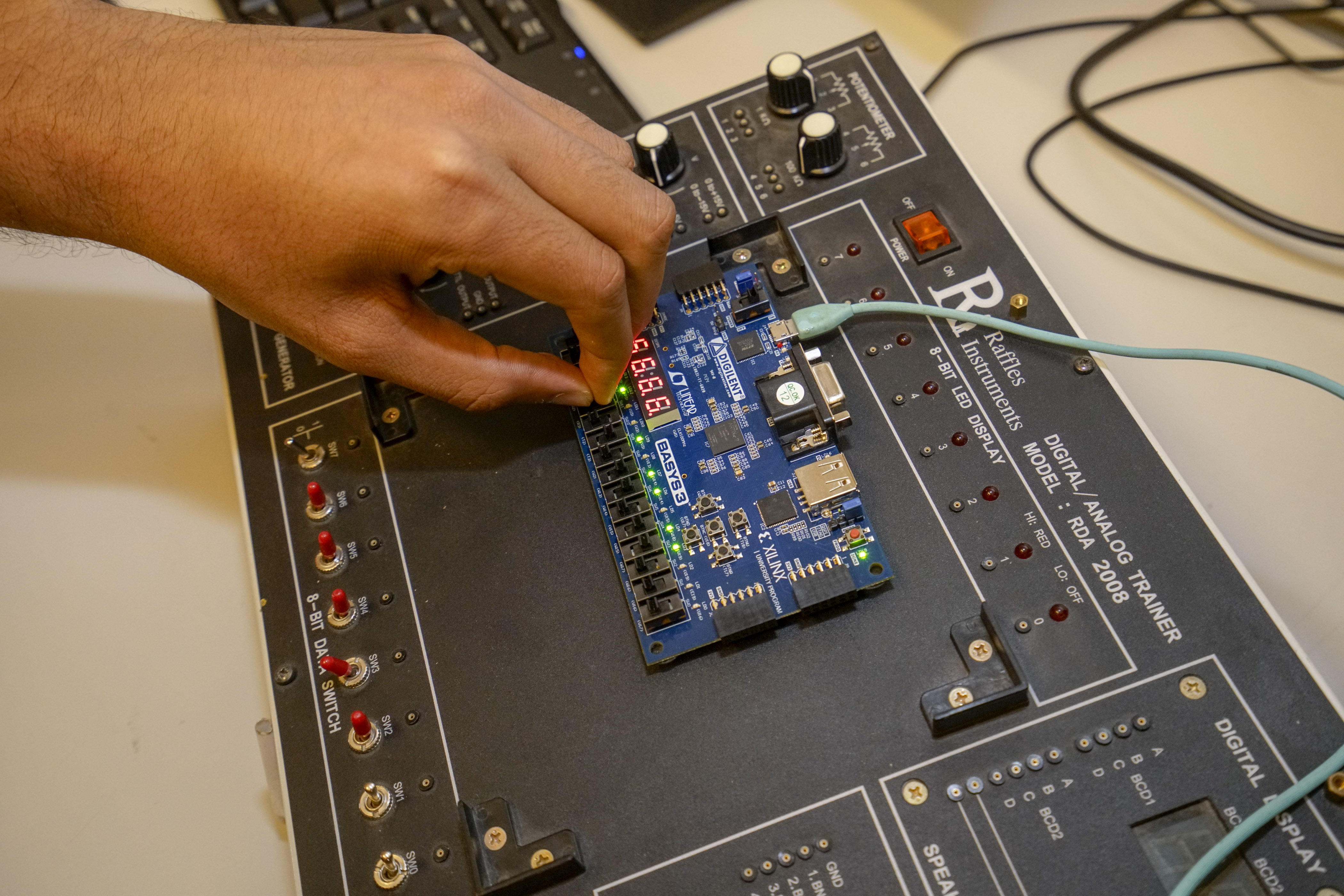Computer Engineering - BS
Program Overview
Are you ready to excel in a world of limitless career opportunities at leading tech companies? AUC's Bachelor of Science in Computer Engineering program places you at the forefront of technological advancement. With its unique combination of theoretical knowledge and hands-on experience, the program equips you with the skills to design and develop new technologies for a variety of applications.
The program provides the foundation and areas of specialization necessary to analyze, design and evaluate system software, middleware and software/hardware architectures and interfaces. The specific objectives of the program are to: educate students with a breadth of knowledge in computer engineering that would allow them to contribute to computing projects individually or as members of multidisciplinary teams with emphasis on the creative applications of scientific knowledge in the analysis, design, and implementation of economical computer software and hardware systems; introduce students to a broad spectrum of computer engineering topics, with concentration in one or more computing areas of their choice; prepare students to cope with, and improve on, the ever-evolving discipline of computer engineering and state-of-the-art technologies in the industry of software and hardware systems.
The Computer Engineering (B.S.) program is accredited by the Engineering Accreditation Commission of ABET, https://www.abet.org, under the commission's General Criteria and the Program Criteria for the Electrical, Computer, Communications, Telecommunication(s) and Similarly Named Engineering Programs.

Specializations
- Embedded Systems
- Artificial Intelligence

Program Educational Objectives
Graduates of AUC's computer engineering program are qualified to fill one or more of the following positions within a few years after their graduation while taking ethical and environmental concerns into account:
- Professional team member in a multidisciplinary environment, local or global
- Distinguished member of the computer engineering field through promotion or professional development
- Successful member of an advanced academic or research organization
- Successful entrepreneur
Degrees and Admission Requirements
Students wishing to pursue a Bachelor of Science in computer engineering should meet the minimum academic and admission requirements set by AUC.
ABET Student Outcomes
- An ability to identify, formulate, and solve complex engineering problems by applying principles of engineering, science, and mathematics.
- An ability to apply engineering design to produce solutions that meet specified needs with consideration of public health, safety, and welfare, as well as global, cultural, social, environmental, and economic factors.
- An ability to communicate effectively with a range of audiences.
- An ability to recognize ethical and professional responsibilities in engineering situations and make informed judgments, which must consider the impact of engineering solutions in global, economic, environmental, and societal contexts.
- An ability to function effectively on a team whose members together provide leadership, create a collaborative and inclusive environment, establish goals, plan tasks, and meet objectives.
- An ability to develop and conduct appropriate experimentation, analyze and interpret data, and use engineering judgment to draw conclusions.
- An ability to acquire and apply new knowledge as needed, using appropriate learning strategies.
Career Paths and Practical Experience
Internship opportunities through AUC's Career Center are available at leading establishments, including Microsoft, IBM, P&G, Dell EMC, SAP, ITWorx, Mentor Graphics and AUC Technology Solutions, among others.
Graduates of the computer engineering program have found success in these careers:
- Software engineers
- Hardware engineers
- Developers
- Web developers
- Systems managers
- Database administrators
- System analysts
Scholarships
Excellence for Everyone
AUC will help you set your path to success from day one.
Students can receive anywhere from 20% to 100% of tuition coverage through scholarships and the Excellence Scholarship Program.
| 2014-2015 | 2015-2016 | 2016-2017 | 2017-2018 | 2018-2019 | 2019-2020 | |
| Full-Time Students * | 142 | 151 | 191 | 236 | 274 | 298 |
| Part-Time Students * | 4 | 4 | 2 | 3 | 7 | 1 |
| Student FTE | 144.67 | 153.83 | 192.17 | 237.75 | 279.75 | 298.75 |
| Graduates ** | 12 | 17 | 24 | 25 | 39 | 9 |
* Fall term enrollment figures
** Undergraduate degrees conferred during the academic year until Fall 2019
Important Note: Enrolment figures include secondary major students



Discover More in Academics
Learn about related programs, minors, accreditation and more.
